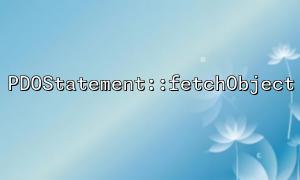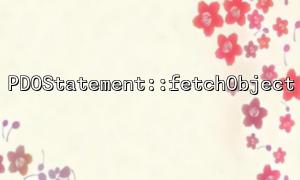In PHP, PDOStatement::fetchObject is a common method for converting the result set of database queries into objects. However, during the actual development process, we may encounter some common errors that cause the method to not work properly. This article will introduce how to troubleshoot these common errors, and will come with a comparison and analysis of PDO::FETCH_ASSOC , helping developers better understand the differences and usage scenarios of these two methods.
A common problem is that when using fetchObject , the return value is null . This is usually because the database query does not return any results, or the object mapped class is not specified correctly.
Confirm whether the query returns a result : Before using fetchObject , make sure that the SQL query has been successfully executed and returns at least one row of data. You can check whether there is any result through rowCount() or fetchAll() .
$stmt = $pdo->prepare("SELECT * FROM users");
$stmt->execute();
// Check if there is data
if ($stmt->rowCount() > 0) {
$user = $stmt->fetchObject();
} else {
echo "No data";
}
Confirm that the class name is used correctly : If you want to map the result to a specific object class, make sure that the class name is correctly passed in the fetchObject method. If no class name is passed, the returned standard object will be.
class User {
public $id;
public $name;
}
$stmt = $pdo->prepare("SELECT * FROM users WHERE id = :id");
$stmt->execute([':id' => 1]);
$user = $stmt->fetchObject('User');
if ($user !== null) {
echo $user->name;
} else {
echo "The user was not found";
}
In some cases, the database column name and the attribute name of the PHP class do not case, which causes the fetchObject to not map the data correctly.
Use PDO::ATTR_DEFAULT_FETCH_MODE to set the default fetch mode : You can avoid case-sensitive issues by setting the default fetch mode of PDO . For example, it can be set to PDO::FETCH_ASSOC , so that the result returned will be an associative array, avoiding the problem of case mismatch.
$stmt = $pdo->prepare("SELECT * FROM users");
$stmt->execute();
$user = $stmt->fetchObject();
Ensure that the database column name is consistent with the object attribute name : To avoid case problems, it is best to keep the database field name and class attribute name consistent.
If the mapped class has a constructor and requires parameters, fetchObject may not instantiate the object correctly.
Pass constructor parameters when using fetchObject : If the class has a constructor, you can pass the parameters required by the constructor through the second parameter of fetchObject .
class User {
public $id;
public $name;
public function __construct($id) {
$this->id = $id;
}
}
$stmt = $pdo->prepare("SELECT * FROM users WHERE id = :id");
$stmt->execute([':id' => 1]);
$user = $stmt->fetchObject('User', [1]);
PDO::FETCH_ASSOC and PDOStatement::fetchObject are common ways to get database query results, but they have significant differences:
PDO::FETCH_ASSOC : Returns an associative array with each column name as the key of the array and the column value as the value of the array. Suitable for scenarios where objects are not needed, especially when you only need to get the field values of the database.
$stmt = $pdo->prepare("SELECT * FROM users WHERE id = :id");
$stmt->execute([':id' => 1]);
$result = $stmt->fetch(PDO::FETCH_ASSOC);
echo $result['name'];
PDOStatement::fetchObject : Returns an object instance, the property name is the database field name (default). Suitable for scenarios that want to map directly to objects, usually used in object-oriented programming.
$stmt = $pdo->prepare("SELECT * FROM users WHERE id = :id");
$stmt->execute([':id' => 1]);
$user = $stmt->fetchObject();
echo $user->name;
Use PDO::FETCH_ASSOC : If you only care about the values of the database field and don't need to map the query results into objects, then FETCH_ASSOC is a more efficient choice. The associative array it returns can directly obtain field values.
Use fetchObject : If you need object-oriented programming and want to represent each row of data in the database as an object, fetchObject is ideal. It is more in line with OOP's design ideas and is especially suitable for scenarios where complex data operations are required.
When using PDOStatement::fetchObject , common errors are usually related to database query results, class mapping, constructors, etc. To resolve these problems, you need to confirm that the query returns data, make sure that the class matches the database field, and handle the constructor correctly.
At the same time, understanding the difference between PDO::FETCH_ASSOC and fetchObject is very important for choosing the right data acquisition method. For most simple queries, PDO::FETCH_ASSOC provides higher efficiency, while fetchObject is suitable for scenarios where object-oriented operations are required.
I hope this article can help you better understand and troubleshoot PDOStatement::fetchObject -related issues.
Related Tags:
PDOStatement PDO














